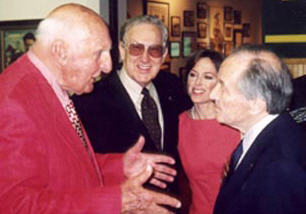|
ASA Sportscaster Profile: Chuck ThompsonThe following is an interview of Chuck Thompson, the late, great voice of the Baltimore Orioles, conducted by ASA President Lou Schwartz. The interview took place on June 28, 2003, when ABC sportcaster Jim McKay was honored by the Maryland Society for Sight as the 2003 "Person of Vision" at the Pimlico Race Course.
(l. to r.) Baltimore Orioles announcer Chuck Thompson, ASA President Lou Schwartz, Olympic skater Dorothy Hamill and ABC sportscaster Jim McKay
Chuck Thompson: $14.20 a week. And I was overpaid. I was up around $21.00 when I was told there was more money available in Philadelphia. So I went to Philadelphia and worked for a man by the name of John B. Kelly at WIBG. It was a good place to be. LS: When did you get your first big break? CT: They sent me down to do Navy football from Philadelphia. The people at the Naval Academy were very fair to me. They gave me every opportunity to do the job. That gave me a little bit of background that I didn't have before. From there, one thing led to another and I ended up here in Baltimore. LS: You worked with Jon Miller. Tell me about that. CT: When you're working with Jon Miller, you're working with one of the real good ones. Nothing gets him upset. He laughs it off. He laughs at himself. And a guy that laughs at himself is a pretty good person. He's one of the best announcers that I ever worked with. LS: What happened when you heard he was leaving Baltimore? CT: I didn't like it at all. I wanted him to stay here but there wasn't much I could do. He has the ability to go just about anywhere he wants. His record is outstanding. And, along with it, he's a helluva nice guy. LS: It's amazing that the sportscasters of your generation were just really good people. CT: Yes. I've worked with Byrum Saam up in Philadelphia. I thought he was an excellent broadcaster. I worked with Bill O'Donnell down here in Baltimore. He was an outstanding broadcaster. And when you have good people in the booth, they are going to help each other, which is good. LS: What great event that you were a part of stands out in your mind? CT: I thought the Colts and the Giants championship game was one of the greatest football games ever played in the history of the NFL. It was a game that either team was capable of winning. The Colts just ended up doing what had to be done to win. When we came back on the buses from New York that afternoon and we got in front of Memorial Stadium, I knew that Baltimore was a little bit different than other cities. I never saw so many people. The only bad part was that I couldn't get to my favorite bar. But I finally got there a little later. LS: Did you know Harry Caray? CT: I knew Harry Caray. He was an outstanding guy. A good broadcaster. He also was a guy that always knew what was going on and a guy that was not afraid to express his opinions. There was a time in our business when you didn't make any negatives. Now if the guy is not playing well, it's our job as a reporter to say so. And he's one of the first that did. LS: But many don't. A lot of times the ball clubs control who the sportscaster is and he's kind of leery to do so. Especially in New York with the Yankees and the YES Network. There's a lot of complaining about the fact that they don't knock the players. George Steinbrenner might say, ‘Arrivederci.' CT: But today you're a reporter and if you don't let the public know that this guy is not playing as well as he should, you're not doing your job. LS: I know that. But you might not have a job if you do. CT: I don't think it's that way anymore. I really don't think so. Like Jon Miller. One of the best in the country. There's nobody that's going to tell Jon Miller not to say something about a ball player. And if they told me that I couldn't say something, at this stage in my career, I would feel the same way. LS: You've got to realize, you're not the youngsters of today. You guys are the legends. They can't just toss you around. CT: I don't know about legends. We're just guys that have been employed for quite a few years. And the money wasn't that good either. And you know what, I don't think many of us cared about it. If we got a little money, that was fine. And then, as time went by, the money got better and better and we didn't find any fault with that either.
|
